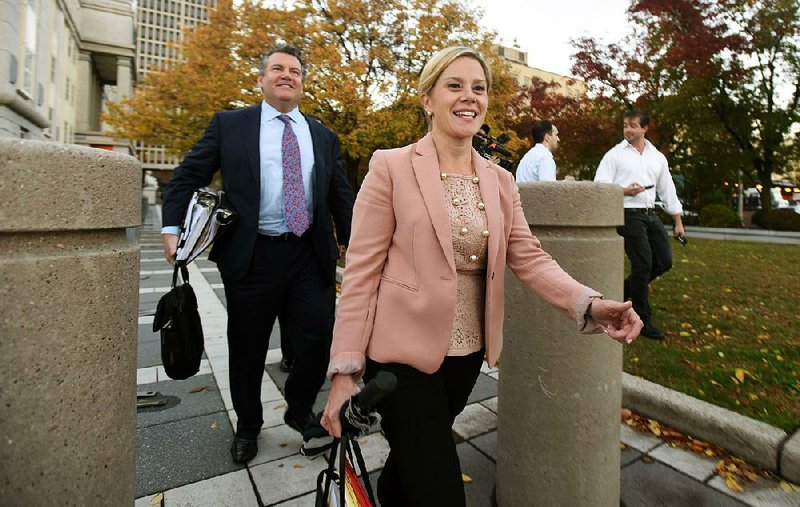NEWARK, N.J. -- The former aide to Gov. Chris Christie of New Jersey at the center of the political plot to close access lanes at the George Washington Bridge broke her long silence in federal court on Friday, saying the idea to close the lanes had been sold to her as a policy matter to move traffic more rapidly across the Hudson River, and that the governor had signed off on it.
The former aide, Bridget Anne Kelly, was the author of the email that set off the so-called Bridgegate scandal when it was revealed in January 2014: "Time for some traffic problems in Fort Lee."
In her testimony in court, where Kelly is now charged with directing the lane closings to punish the mayor of Fort Lee, N.J., after he did not endorse the governor, that bold directive sounded more like bureaucratic churning.
Kelly, ostracized by the governor as a rogue and a liar after her email was exposed, came off as a newly promoted employee who had been eager to please her boss, Christie.
She had witnessed his temper up close, she said: Upset with an idea she had in a meeting, he once threw a water bottle at her; shortly before the lane closings, he had told her to cancel meetings with the mayor of Jersey City after he, too, declined to endorse the governor, who said that no one was entitled to a meeting, using an expletive. So Kelly was careful to follow his instructions.
Until now, she has been known only through her emails -- sounding like a callous and ambitious aide, punishing the mayor and then ignoring his complaints about public safety problems as the administration of Christie, a Republican, sought to build a re-election majority that could propel the governor to the White House.
Kelly said that David Wildstein, a former political blogger who was the governor's enforcer at the Port Authority of New York and New Jersey, which operates the bridge, had approached her with an idea for a traffic study in the summer of 2013.
Wildstein has pleaded guilty to orchestrating the lane closings and is now the prosecution's chief witness against Kelly and Bill Baroni, once the governor's top staff employee at the Port Authority.
The way Wildstein pitched it, she said, the three access lanes from the local streets of Fort Lee were slowing traffic along the main highway across the bridge.
The local access lanes had been granted in a political deal between a prior mayor of Fort Lee and a prior governor of New Jersey.
The Port Authority, Wildstein said, wanted to end that privilege, and would do a study of the impact. Kelly said he told her that there would be extensive traffic problems in Fort Lee, but that those difficulties would go away once people who used the local lanes figured out a new route.
He told her that he had run the idea past Bill Stepien, the governor's campaign manager, and asked her to run it past the governor. And, she said, he put a cherry on top: Once the study was complete, they would hold a celebratory event at the bridge, where the governor, then in the thick of his re-election campaign, would be able to trumpet how he had eased traffic across the world's busiest bridge, a bane of commuters. There would be banners saying, "Thanks, Governor Christie."
"It was a little crazy, but this is what he wanted to do, to tout the success of what he believed was going to be a very successful study," she said.
Kelly said she told the governor on Aug. 12, 2013, the day before she sent her now-famous email, that the Port Authority would do a traffic study, and that there would be problems in Fort Lee.
The governor, she said, told her that was fine. He asked her two things: He wanted her to inform his chief of staff, and he wanted to know what the administration's relationship was with the mayor.
When she told him about Wildstein's idea for the political event, he said, "That's typical Wally," using the name under which Wildstein wrote his political blog, Wally Edge.
The governor then said, "If our schedules work, let's have lunch tomorrow."
Kelly said she had been embarrassed that she could not answer the governor's question about the mayor. She was nervous about the lunch, and wanted to make sure she had all the details when she saw him again.
So, she said, she checked with staff members who knew the Fort Lee mayor best. And she informed the governor's chief of staff of the bridge plan. Just as she prepared to drive to work, she wrote the email to Wildstein.
"Traffic problems," she said, was a shorthand she took from Wildstein.
"Poor choice of words?" Michael Critchley, her lead lawyer, asked her.
"Very," Kelly responded.
Asked why she thought she had needed to inform the governor about a Port Authority policy matter, she said, "I was scared if I didn't tell him of what would happen, that I would get blame for something that I didn't do."
A Section on 10/23/2016
